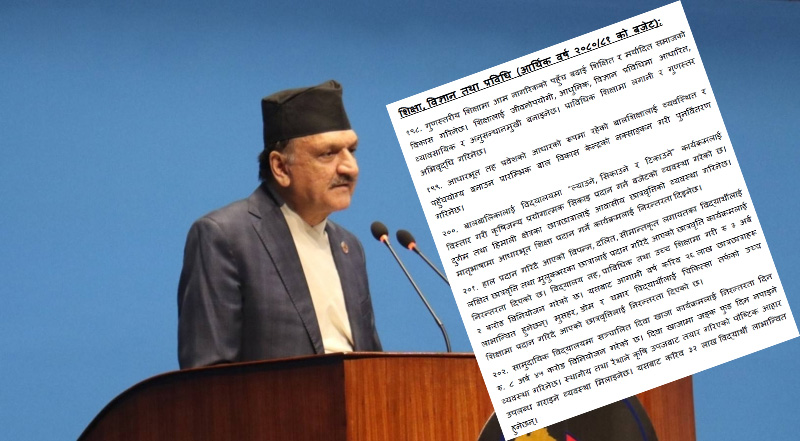
Government Allocates Increased Budget for Education Sector in the Financial Year 2080/81
In a significant move, the government has announced an increased budget for the education sector in the upcoming financial year 2080/81. A total of one billion 97 billion 29 million rupees has been allocated, which accounts for 11.26 percent of the overall budget.
Continuing its focus on education, the government has decided to maintain the existing programs and initiatives without introducing any new ones in the education budget for the next year. This decision aims to ensure continuity and stability in the education sector.
The Finance Minister, Dr. Prakashsharan Mahat, emphasized the government's commitment to developing an educated and dignified society by enhancing access to quality education for the general public. The budget also prioritizes creating a modern and technologically advanced education system that prepares students for practical life, professions, and research-oriented pursuits. The government aims to invest in technical education and enhance its overall quality.
As part of its ongoing efforts to support underprivileged students, the government has continued the scholarship program for economically disadvantaged, Dalit, marginalized, and female students across the country. A total of three billion and two million rupees have been allocated for this program, benefiting students at the school, technical, and higher education levels.
The government has also ensured the continuation of the midday meal program in public schools for the upcoming year. An allocation of eight billion 45 crore rupees has been made for this program, which is estimated to benefit approximately 32 lakh students. The Finance Minister has emphasized the government's commitment to banning the distribution of junk food during midday meals, promoting healthier dietary habits among students.
Recognizing the importance of menstrual hygiene and female empowerment, the government has allocated one billion 40 crore rupees for the free distribution of sanitary pads to school girls. This initiative will benefit around 10 lakh girl students. Furthermore, an allocation of three billion 58 million rupees has been made to provide free textbooks to all students in community schools, along with electronic copies of curricula and textbooks.
In the next financial year, the government plans to review teacher positions based on subject and student ratios. An allocation of three billion 69 million rupees has been made to ensure the availability of English, mathematics, and science teachers in secondary and basic schools with vacant positions.
To support students from remote and Himalayan regions, the government will arrange residential scholarships. Additionally, the program of providing basic education in students' mother tongues will continue. It is estimated that approximately 2.6 million students will benefit from these initiatives in the coming year. Furthermore, scholarships for Musahar, Dom, and Chamar students pursuing higher education in medicine have been continued.
In a bid to promote inclusivity, the government plans to integrate traditional education systems such as Gurukul, Madrasah, and Gumba into the formal education system. Moreover, sign language and braille textbooks will be provided free of charge, ensuring accessibility for students with disabilities.
While the government has decided to continue the Presidential Educational Reform Program, no budget allocation has been made for it in the next financial year. However, Finance Minister Dr. Prakasharan Mahat assured that feasibility studies and preparatory work will continue for the establishment of one model residential community school in Dhankuta, Bardibas, Tansen, Surkhet, and Dadeldhura, under the guidance of the educational group.
Highlights of the Increased Budget for the Education Sector
- The government has allocated a higher budget for the education sector in the next financial year 2080/81, with a total of one billion 97 billion 29 million rupees.
- This allocation represents 11.26 percent of the overall budget, indicating the government's commitment to prioritizing education.
- The focus of the budget is on developing an educated and dignified society by enhancing access to quality education for the general public.
- Emphasis has been placed on making education modern, science and technology-based, professional, and research-oriented.
- Technical education is a key area of investment to improve its quality and meet the demands of a rapidly evolving job market.
- The government has continued its scholarship program for economically disadvantaged, Dalit, marginalized, and female students across the country.
- The midday meal program in public schools will be continued, with a significant allocation of eight billion 45 crore rupees.
- The distribution of junk food during midday meals has been banned to promote healthier dietary habits among students.
- Sanitary pads will be provided free of charge to school girls, benefiting around 10 lakh students.
- Free textbooks will be provided to all students in community schools, along with electronic copies of curricula and textbooks.
- Teacher positions will be reviewed based on subject and student ratios to ensure adequate staffing in secondary and basic schools.
- Residential scholarships will be arranged for students from remote and Himalayan areas.
- The program of providing basic education in students' mother tongues will be continued.
- Scholarships for Musahar, Dom, and Chamar students pursuing higher education in medicine have been continued.
- Traditional education systems such as Gurukul, Madrasah, and Gumba will be integrated into the formal education system.
- Sign language and braille textbooks will be provided free of charge, promoting inclusivity for students with disabilities.
- The Presidential Educational Reform Program will be continued, with a focus on feasibility studies and preparatory work for model residential community schools in specific regions.





